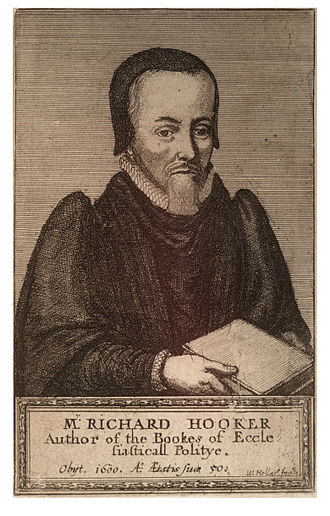 In the calendar of the Book of Common Prayer we commemorate/venerate Richard Hooker who was an Anglican Priest and Theologian. Quoting Wikipedia: He was one of the most important English theologians of the sixteenth century. His defence of the role of redeemed reason informed the theology of the seventeenth century Caroline Divines and later provided many members of the Church of England with a theological method which combined the claims of revelation, reason and tradition. Scholars disagree regarding Hooker’s relationship with what would later be called “Anglicanism” and the Reformed theological tradition. Traditionally, he has been regarded as the originator of the Anglican via media between Protestantism and Catholicism. However, a growing number of scholars have argued that he should be considered as being in the mainstream Reformed theology of his time and that he only sought to oppose the extremists (Puritans), rather than moving the Church of England away from Protestantism.
In the calendar of the Book of Common Prayer we commemorate/venerate Richard Hooker who was an Anglican Priest and Theologian. Quoting Wikipedia: He was one of the most important English theologians of the sixteenth century. His defence of the role of redeemed reason informed the theology of the seventeenth century Caroline Divines and later provided many members of the Church of England with a theological method which combined the claims of revelation, reason and tradition. Scholars disagree regarding Hooker’s relationship with what would later be called “Anglicanism” and the Reformed theological tradition. Traditionally, he has been regarded as the originator of the Anglican via media between Protestantism and Catholicism. However, a growing number of scholars have argued that he should be considered as being in the mainstream Reformed theology of his time and that he only sought to oppose the extremists (Puritans), rather than moving the Church of England away from Protestantism.
In 1584 Hooker became Rector of Saint Mary’s Church, Beauchamp, and Buckinghamshire and then was appointed Rector of the Temple Church in London by the Queen. While at the Temple Church Hooker came into public conflict with Walter Travers, a leading puritan and reader at the Temple. T is believed that the crux of the dispute centered on statements made by Hooker in a previous sermon in which he expressed the opinion that salvation was possible for some Roman Catholics. The controversy ended when Travers was silenced by the Archbishop of Canterbury.
It was during the period in which the controversy with Travers raged that Hooker composed a work titled Of the Lawes of Ecclesiastical Politie. In this work Hooker’s philosophical base is Aristotelian with a strong emphasis upon natural law eternally planted by God in creation. On this foundation all positive laws of Church and State are grounded – from Scriptural revelation, ancient tradition, reason and experience.
Book Five of the Lawes is a massive defense of the Book of Common Prayer directed primarily against Puritan detractors. According to Lesser Feasts and Fasts “Hooker’s arguments are buttressed by enormous patristic learning but the needs of the contemporary worshiper are paramount and he draws effectively on his twenty year experience using the Book. Hooker’s vast learning, and the quality of his style, reveals him to be a man of moderate, patient, and serene character.
On the nature of the Church, states Lesser Feasts and Fasts, Hooker wrote: “The Church is always a visible society of men; not an assembly, but a Society. For although the name of the Church be given unto Christian assemblies, although any multitude of Christian men congregated may be termed by the name of a Church, yet assemblies properly are rather things that belong to a Church. Men are assembled for performance of public actions which actions being ended, the assembly dissolveth itself and is no longer in being, whereas the Church which was assembled doth no less continue afterwards than before.”
Hooker’s theological thought even showed an ecumenical flavor as Pope Clement VIII is reported to have said that Hooker’s work “had in it such seeds of eternity that it would abide until the last fire shall consume all learning.”
In this time that the liturgical churches are moving closer to reunification the insightful, moderate thought of theologians such as Hooker it seems to this layman provide a guide to a reunification of theological thought as well as a reunification of liturgical practice. Christian churches as “Societies” have much more in common than in difference.